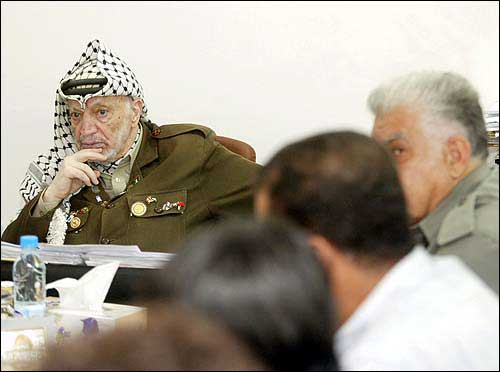‘Road map’ for peace detoured after resignation of Palestinian
RAMALLAH, West Bank ? Palestinian Prime Minister Mahmoud Abbas abruptly resigned Saturday after only four months in office, plunging the faltering U.S.-backed Middle East peace initiative into deeper disarray and leaving a potentially dangerous power vacuum in the Palestinian leadership.
Fueling a sense of chaos in the hours after Abbas announced he was calling it quits, Sheik Ahmed Yassin, founder and spiritual leader of the militant group Hamas, barely escaped with his life when an Israeli jet bombed a building in Gaza City where the group’s leaders were meeting.
Yassin was slightly wounded, Hamas associates said.
Volatile Gaza had been simmering with anger over the deaths of a dozen Islamic militants during the past three weeks. Israeli military sources said they launched the attack Saturday because it was an opportunity to eliminate the remaining leadership of Hamas. Had it succeeded in killing Yassin, a revered figure in the slums and refugee camps of the seaside enclave, the result probably would have been an outburst of uncontrolled rage.
Hamas vowed revenge. “Our reaction will be on a different scale than anything Israel has seen before,” the group’s military wing said in a statement.
Counterbalance gone
The collapse of Abbas’ government is a blow to Israel and the United States, which had viewed him as a good-faith partner in peace negotiations as well as a counterbalance to the pervasive influence of Palestinian Authority President Yasser Arafat.
In Washington, the White House said the appointment of Abbas had been a turning point for the Palestinian Authority, and that it remained committed to the so-called “road map” peace plan. It called all sides to “consider carefully the consequences of their actions.”
“We hope the Palestinian legislature will continue to act in a way that empowers the prime minister to fight terror and bring a better way of life to the Palestinian people,” the White House said in a statement. “The prime minister must be supported by a Cabinet committed to fighting terror, political reform, and rooting out corruption.”

Palestinian leader Yasser Arafat listens during a meeting with a foreign delegation at his compound in the West Bank town of Ramallah. Arafat on Saturday accepted the hasty resignation of Prime Minister Mahmoud Abbas.
Almost immediately after Abbas announced his resignation, in a speech at a closed session of the Palestinian legislature, Israel declared it would have no dealings with any new Palestinian government that was dominated directly or indirectly by Arafat.
“Israel will not accept a situation where control of the Palestinian Authority is returned to Arafat or anyone who does his bidding,” Prime Minister Ariel Sharon said in a statement.
Several top Israeli officials renewed their calls to expel Arafat from the Palestinian territories. Sharon and Arafat have been sworn enemies for much of their adult lives, but even so, the Israeli prime minister has been unwilling to risk the consequences of expelling the Palestinian leader.
Analysts have predicted such a move would spark widespread riots by Palestinians who revere Arafat as a symbol of their national struggle. They also say Israel would incur international opprobrium by expelling an elected leader whose legitimacy is recognized by most governments around the world, although not by the United States and Israel.
Israel also worries that a globe-trotting Arafat could prove to be a far more disruptive force than he has been during nearly two years of confinement in his shell-pocked headquarters in the West Bank town of Ramallah.
The Bush administration and Sharon for many months have sought to isolate Arafat diplomatically, but received the latest rebuff last week from the European Union, which refused to abandon contacts with him.
Resignation accepted
Arafat relayed word that he had accepted Abbas’ resignation in typically oblique fashion — perhaps in an attempt to distance himself from having played a role in the prime minister’s ouster.
In an encounter that lasted only 10 minutes, Arafat summoned lawmakers, top officials and members of his Fatah faction Saturday evening to his headquarters and read Abbas’ letter of resignation. Then, according to several officials who were present, he turned to government ministers and told them: “You are the caretaker Cabinet now.”
While this left some puzzled as to whether Abbas’ departure had been formalized, Foreign Minister Nabil Shaath told reporters: “This implicitly means Arafat has accepted the resignation.”
For Abbas, it was a hard, fast fall. Scarcely three months ago, the prime minister stood on a sunlit Jordanian beach, shoulder to shoulder with President Bush and Sharon, to endorse the American initiative known as the “road map,” which laid out steps by both sides meant to lead to Palestinian statehood.
But little had gone right for Abbas since then. As his tenure grew increasingly stormy, he repeatedly threatened to quit. This time, a running battle with Arafat over control of the Palestinian security forces and increasing virulent domestic opposition to his government pushed him to followed through.
Unpopular from the start, Abbas saw his street credibility drop precipitously as the perception grew among his people that he was too conciliatory toward Israel. And ordinary Palestinians grew restive as the road map did little to improve their daily lives.

